People skills are an essential part of work, life, and social success. When you have strong people skills, you are better able to:
- Pitch yourself
- Overcome social anxiety
- Communicate your ideas
- Influence others positively
What are people skills? People skills are the tools you use to communicate and interact effectively with others. Individuals with strong people skills are able to predict behavior, relate to others, and socialize easily. People skills also are known as soft skills, interpersonal skills, social skills, emotional intelligence, and interpersonal intelligence.
Research has even found that those who have strong people skills make an average of $29,000 more per year!
Watch our video below to learn the 10 essential people skills you need to succeed:
People skills are one of the most underappreciated areas of career development. In career development, we are lucky if we have the occasional soft skills training or communication course. I believe interpersonal intelligence, or PQ, needs to be honed. Just like we develop our IQ, we need to work on our PQ. People smarts are just as important as book smarts.
People Skill Science
Researchers define people skills as three sets of abilities. First, someone’s personal effectiveness. As a people skill, personal effectiveness is all about how you come across to others. Are you able to pitch yourself? Can you communicate clearly? Can you get what you need from others? Someone with strong personal effectiveness typically also makes a memorable first impression and has a confident presence with the people they meet.
Second, is your interaction ability. This is how well you predict and decode behavior. In an interaction, can you empathize with someone? Are you highly perceptive?
Finally, someone with strong people skills is able to intercede easily. This means they are able to lead, influence, and build bridges between people. Are you a connector? A mediator? Oftentimes this can be calming down difficult or toxic people.
The 10 People Skills Everyone Should Know:
This is the ultimate soft skills list. Read through the following people skills and examine your own interpersonal strengths and weaknesses. Here at the Science of People lab, we have found 10 skills that come up over and over again with highly effective individuals.
Social Assertiveness
Do you stand up for yourself in social situations? Do you feel confident interacting with others? Are you assertive with your social needs? Social assertiveness is essential for conserving social energy.
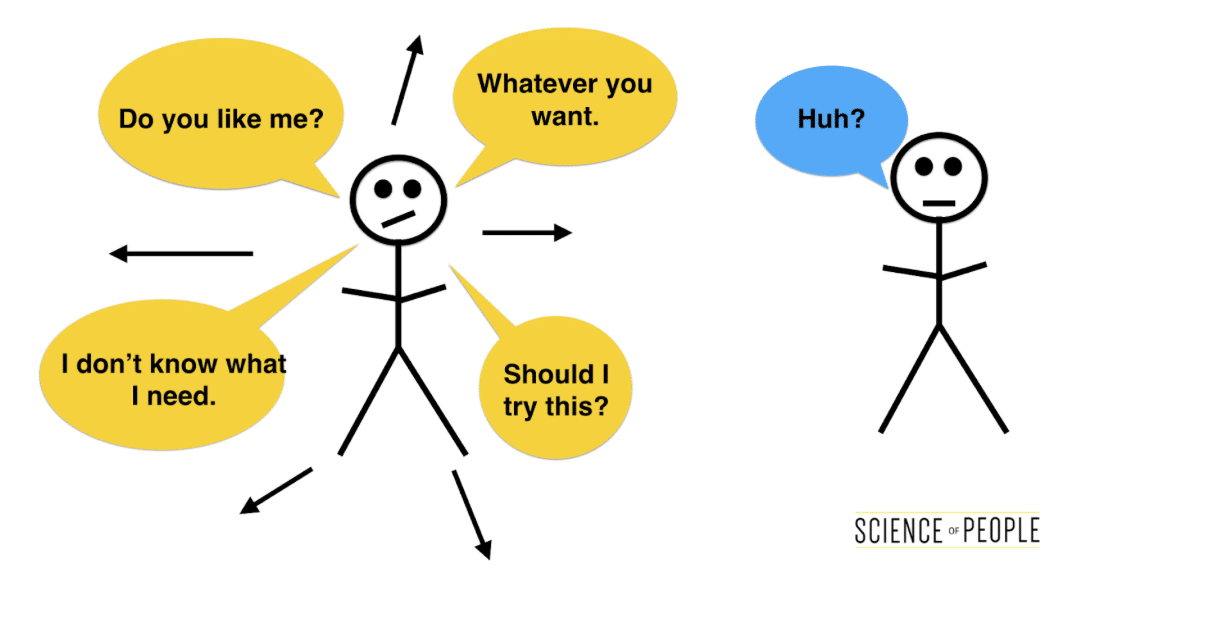
We only have so much social energy to spare. If you are socially assertive, you are able to save and spend your social energy in the right ways. If you lack social assertiveness, your energy is wasted on the wrong people, in awkward situations, or is not aligned with your social goals. People with high social assertiveness have more focused social energy and have more clarity in their interactions:
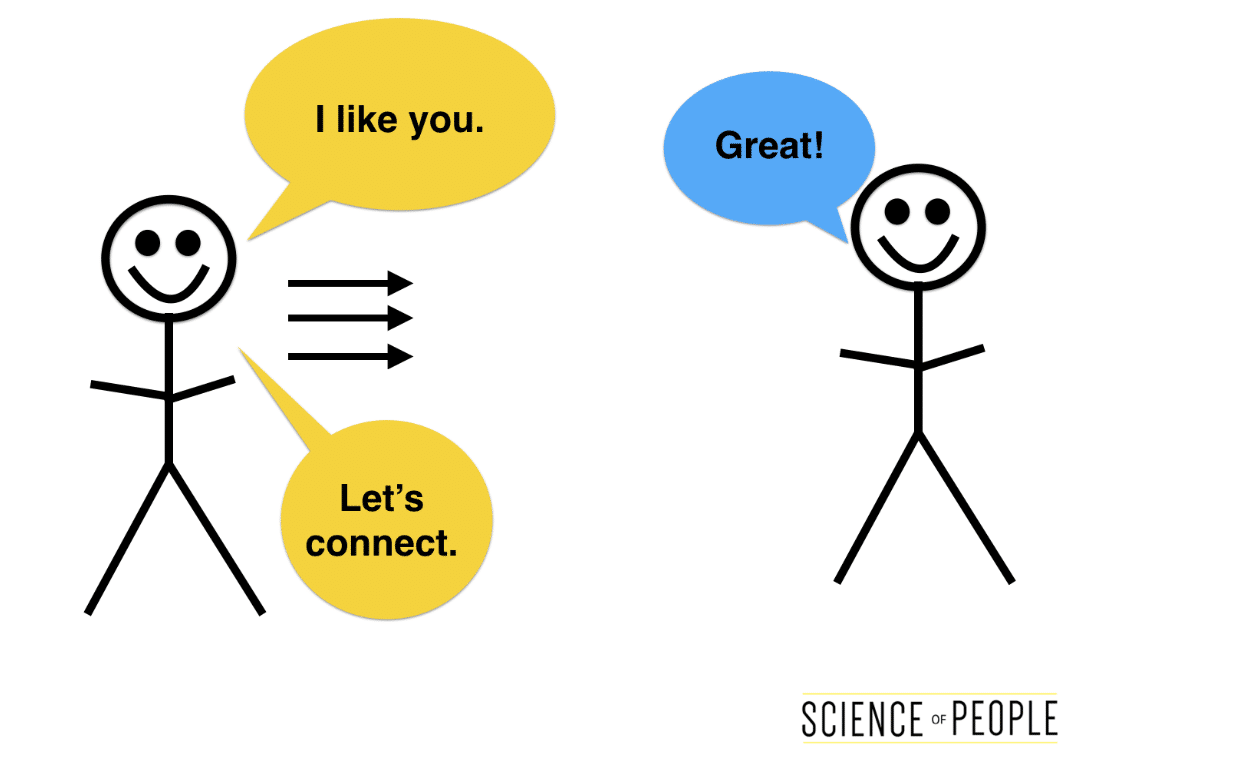
People with low social assertiveness:
- feel out of control in social situations
- are addicted to people pleasing
- have more toxic people in their lives
People with high social assertiveness are able to:
- establish boundaries
- stand up for their needs
- tell people, “No!”
Action Step: Extroverts, ambiverts, and introverts all have different levels of social energy. Figure out if you are an extrovert, introvert, or ambivert, so you can spend your social energy efficiently.
Crafting a Memorable Presence
Are you memorable? Do you make a strong first impression? Do people remember your name after meeting you? People with a great presence have an easy time making lasting connections and are extremely good at rapport-building. Your presence has a direct relationship to your ability to create lasting personal relationships and build a network. If you have a strong presence, people gravitate towards you, remember you better, and are more likely to work with you.
People with a weak presence:
- struggle to get clients or make friends
- frequently deal with people forgetting their name
- feel awkward in many social interactions
People with a memorable presence:
- leave a lasting first impression
- have a robust network
- quickly build rapport
Action Step: Learn how to be interesting. I think everyone has the potential to be fascinating — we just don’t always know how. I have 5 easy steps to be more interesting.
Master Communication
Do you enjoy public speaking and presenting? Specifically, are you comfortable communicating your ideas to large groups? Master communicators know how to present themselves, and effectively get their message across.
Poor communicators tend to:
- think they are unworthy of attention
- avoid sharing their ideas
- cannot get buy-in on their opinions
- are under appreciated for their hard work
Master communicators excel at:
- public speaking
- presenting
- communicating big ideas to big groups
Action Step: I would love to show you how to master public speaking. Most people think this is a skill you cannot learn—not true! Anyone can learn to be a master communicator. Start with our video below on How to Work a Stage Like a Pro:
Want more? Check out our course People School.
Sustain Lasting Confidence
Do you ever feel socially anxious? Everyone feels a little bit of nervousness in some social situations, but the question is: Can you overcome your social anxiety? People who can sustain lasting confidence are able to conquer their shyness and avoid awkwardness. They might have internal strategies or mantras to get them through their anxiety, or they have socialized enough to overcome any nervous tendencies.
People with high social anxiety:
- avoid social situations … even if they would be beneficial to career goals
- feel awkward and trapped
- get stuck in their own head during interactions and conversations
People who can sustain social confidence:
- are able to excel in most social situations
- feel awkward and are able to overcome it
- feel more excited than anxious when socializing
Action Step: Do you have social anxiety? Make sure you know the signs and symptoms, and use our tips to conquer it.
Master Conversation
How do you get past small talk? In my book Captivate, I talk about the idea of BIG talk. This is when you level up boring, predictable small talk into deep, memorable conversation. I believe that most interactions happen in three levels:
The First Five Minutes: This is your first impression, when you decide if someone is worth getting to know. It can happen professionally, romantically, or socially. This level is the front door — can you get invited inside someone’s inner circle?
The First Five Hours: Once you have made it past the first level, you get to have a first meeting, first phone call, or first date. This is when you move past first impressions into rapport building.
The First Five Days: This is the final level. You want people in this level with whom you would be happy to do a weekend road trip. It’s the ultimate level of trust and connection. This could be romantic — with a partner—but it could also be with a long-term business partner or best friend.
Conversation is the key to moving up these three levels. People who struggle with conversation:
- run out of things to say
- do not know how to open a conversation with someone
- have a lot of awkward silences
Master conversationalists:
- know how to engage in memorable conversation…and keep it going
- can easily get past small talk into BIG talk
- use conversation as a tool for everything from rapport building, to socializing, to flirting, to sales
Be Highly Likable
Would people describe you as likable? Is it easy for you to get people on your teams or influence others to your point of view? Likability is an important facet of trust. We often hear about being “authentic” or “genuine.” These are all aspects of likability. In order to like someone we, want them to be congruent with their words and actions. We like people who we feel are showing us their true selves. Psychologist Carl Rogers described a concept called Self-Actualization, which speaks to how closely people show their real self compared to their ideal self.
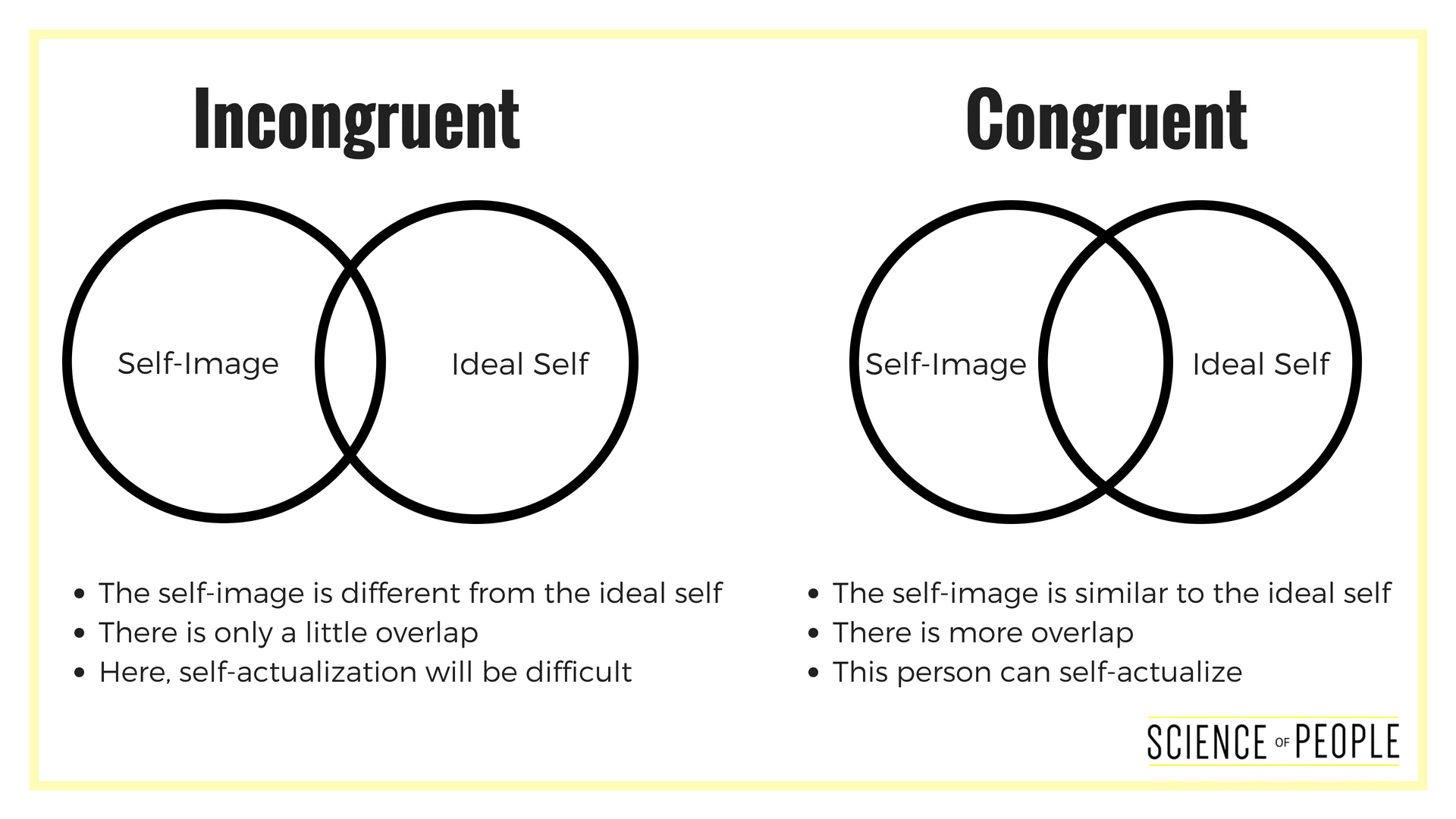
People who are not likable:
- have trouble getting people listen to their ideas
- feel they have lots of potential, but rarely act as their ideal self
- frequently feel left out, or like the odd-man out
Highly-likable people:
- are highly respected and often asked to join in on teams, social engagements, and groups
- feel their ideal self and real self are closely aligned
- are asked their opinions by others
Action Step: Making friends as an adult is a skill. It used to be so easy when we were younger! We had school, camp and sports to bring new people together. As adults, we have to work at it. I have a step-by-step guide on how to make friends as adults.
Exceptional at Decoding Emotions
Would you consider yourself highly perceptive? People who are good at reading people are exceptionally strong at knowing how others think and feel. Decoding people, having a strong sense of intuition, and being very empathetic are the emotional intelligence aspects of interpersonal intelligence. When we look at interpersonal intelligence (or people skills), there are three main branches.
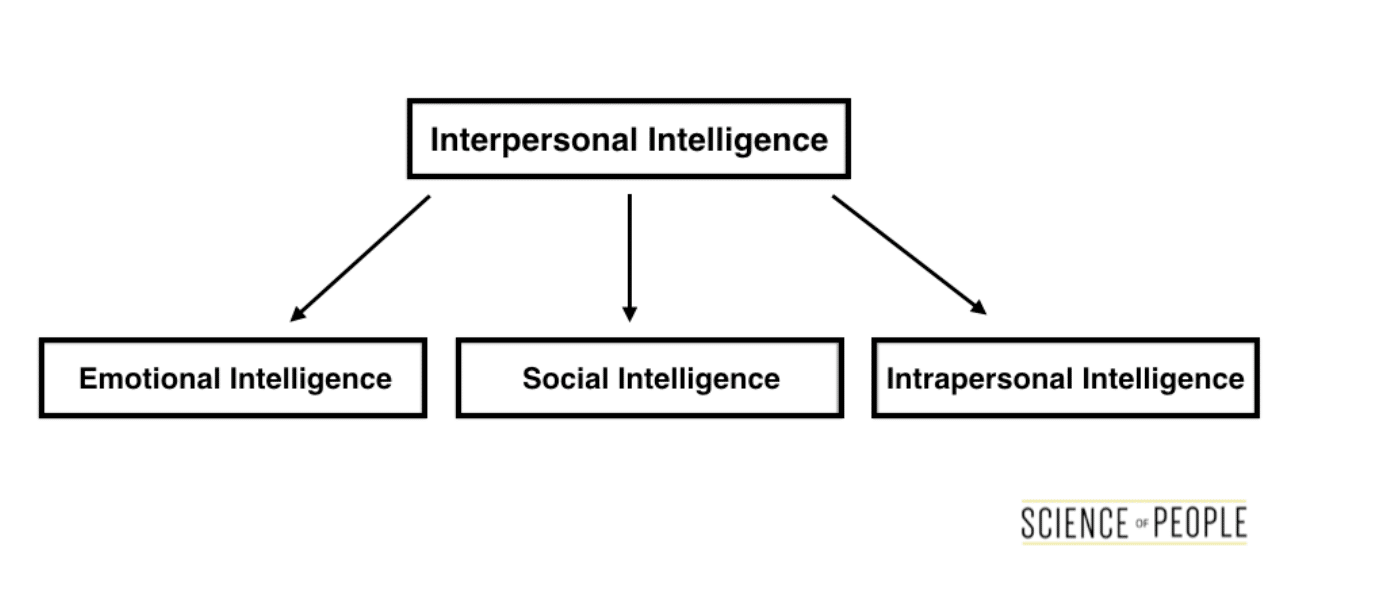
- Emotional Intelligence is how intuitive or empathetic you are.
- Social Intelligence is how you translate your emotions when around others, as well as how responsive you are to their emotions.
- Intrapersonal Intelligence is how well you know yourself, your social needs, and boundaries.
Everyone has different strengths and weaknesses in different aspects of interpersonal intelligence. People who struggle with decoding:
- struggle with empathy
- have trouble reading and interpreting body language and facial expressions
- often miss social cues
People with exceptional decoding abilities:
- can speed-read people and their intentions
- are very good at interpreting body language and facial expressions
- are very intuitive
Action Step: One of the best ways to improve your decoding ability is to learn how to read the 7 microexpressions. We have a definitive guide to reading the face you can use to get started.
Pitch Your Ideas
When people ask, “What do you do?” do you know exactly how to pitch yourself well? When you have to pitch yourself or your ideas, can you do so confidently? Pitching is a very important people skills for professionals because it happens all the time — not just at networking events with your elevator pitch, but also during every meeting when you are asked your opinion, in emails when you introduce yourself, and on conference calls. Now, I know it is never easy to brag about yourself, but you should be able to generate excitement around your ideas. Here’s the big question:
When you talk about yourself, can you get people excited to work with you?
People who struggle with pitching themselves and their ideas:
- feel anxious when talking about themselves
- undersell or minimize their successes
- miss opportunities because they feel undeserving, or they are afraid to speak up(they may even have impostor syndrome.)
People who are great at pitching themselves:
- can get people to adopt their ideas
- feel confident pitching themselves without bragging
Action Step: Do you have imposter syndrome? This is the biggest blocker for people struggling with pitching themselves. Make sure you conquer yours. You are worthy. You deserve success. I’ll show you how to beat impostor syndrome.
Be Charismatic
What is charisma? Most people think that you have to be born charismatic. I couldn’t disagree more! While I was doing research for our flagship course People School, I found that charisma is the perfect blend of two essential people skills traits: warmth and competence. We talk about this more in the course, but here are the basics:
People who are not charismatic:
- are seen as cold or intimidating — people have trouble opening up, trusting and getting to know them
- are seen as flaky or shallow — people do not depend on them easily
- are only warm or only competent — without both, you are not considered charismatic
People who are highly charismatic:
- are seen as highly warm–they are approachable, trustworthy, and likable
- are seen as highly competent–they are seen as dependable, capable and knowledgeable
Action Step: My team and I developed a charisma quiz based on the charisma research. See where you fall on our charisma spectrum.
Be an Influential Leader
You do not have to be leading a company or be the president of an organization to be considered a leader. Leaders in both work life and social life are able to get buy-in, rally teams and generate camaraderie. I do not believe the opposite of a leader is a follower. In fact, sometimes it’s great to be a follower — when you are learning something new or want to be taken on an adventure. It’s almost impossible to be a leader if you struggle with the 3 A’s.
- Apathy: Do you love your life? Do you wake up to the day excited? Apathy is when we have a lack of enthusiasm or interest in our lives or the things we do. Leaders fight apathy by choosing to be around people or do activities that truly excite them.
- Ambivalence kills relationships. If you are ambivalent about the people in your life or the activities in your life, you will never be able to be a leader. I believe that ambivalence is the root cause of frenemies.
- Aimlessness: Leaders have direction. They have goals, plans, and strategic paths. This guides their actions — making them more purposeful, AND it helps others follow.
Leaders fight the 3 A’s:
- Leaders harness and build on excitement. They save their energy for people and tasks that matter to them.
- Leaders know who is on their team and who isn’t. They pick people to have in their lives.
- Leaders make plans. Leaders are driven in their thought and action, and encourage others to follow.
Action Step: Begin to fight the 3 A’s in your life. Start with the one that most resonates with you. Do you need to get rid of some ambivalent relationships? Do you need to set a plan for yourself? Do you need to find activities that truly excite you? This is how you can become a leader.
Bonus: Be Productive
I have one bonus people skill for you. I simply had to include this skill because it has come up for our students over and over again. When our students join People School, we ask them a simple question:
What skills are you currently missing that are preventing you from achieving your goals?
Over and over again, our students give us specific interpersonal skills like the ones above — charisma, communication, confidence. But our third most popular answer? Productivity. Specifically, our students say:
- finding determination
- championing follow-through
- battling distraction
- harnessing motivation
- balancing time management

Master Your People Skills
- Create a Memorable Presence
- Communicate with Confidence
- Achieve Your Goals
Have a question about the presentation or People School? Email Science of People support.

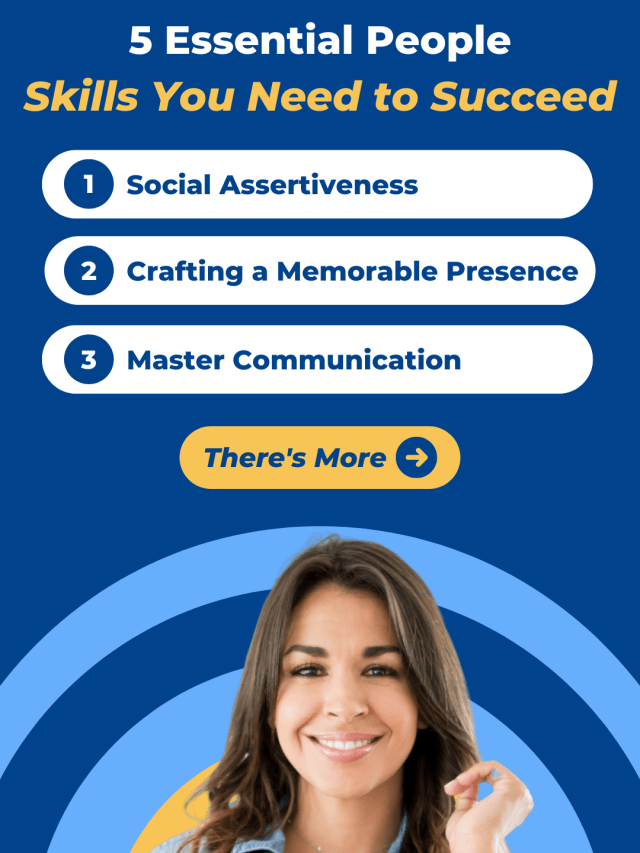
Hi Vanessa, I really love your work. Very practical, easy to follow and addresses the key areas in helping others connect, communication and accomplish things together. I teach professional skills at a University and reference your work a lot. Thanks for what you have created.
Hi Vanessa, I really love your work. Very practical, easy to follow and addresses the key areas in helping others connect, communication and accomplish things together. I teach professional skills at a University and reference your work a lot. Thanks for what you have created.
Hi Vanessa, I really love your work. Very practical, easy to follow and addresses the key areas in helping others connect, communication and accomplish things together. I teach professional skills at a University and reference your work a lot. Thanks for what you have created.
Hi Vanessa, I really love your work. Very practical, easy to follow and addresses the key areas in helping others connect, communication and accomplish things together. I teach professional skills at a University and reference your work a lot. Thanks for what you have created.
I hope I can learn how to increase my knowledge about people skills. Thanks.
I hope I can learn how to increase my knowledge about people skills. Thanks.
I hope I can learn how to increase my knowledge about people skills. Thanks.
I hope I can learn how to increase my knowledge about people skills. Thanks.
Hoping I can increase my knowledge related to people skill. Thanks
Hoping I can increase my knowledge related to people skill. Thanks
Hoping I can increase my knowledge related to people skill. Thanks
Hoping I can increase my knowledge related to people skill. Thanks
Thank you for this!😃
Thank you for this!😃
Thank you for this!😃
Thank you for this!😃